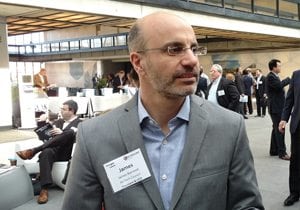
Trade-talk Roundtable: Techies Talk Shop
Leaders from state organizations that support high-tech industries discuss trends and entrepreneurial needs.
By Anthony Birritteri, Editor-in-Chief On Apr 10, 2017In this next installment of our quarterly Trade-talk Roundtable series, New Jersey Business sits down with executives from key trade associations, and one state agency, who support high-tech business growth in the Garden State. The discussion, for the most part, is positive as these leaders tout the state’s highly skilled workforce and improving collaborations between businesses and institutions of higher education. However, the challenge in acquiring start-up financing, coupled with an unpredictable business climate, continue to make it difficult for innovative businesses to start their ventures on solid footing.
The Q&A begins on the next page. Below, we introduce our panel of experts:
James Barrood is president and CEO of the NJ Tech Council, considered one of the largest technology trade associations in the country. Barrood sits on several boards including the Research & Development Council of New Jersey, Jumpstart Angel Network, NJ Innovation Council, InnovationNJ, and the National Association of Corporate Directors-NJ. Prior to heading the Council, Barrood led the entrepreneurship center at Fairleigh Dickinson University for more than 10 years. Since 1997, he has been active in regional entrepreneurial and business communities.
Haskell Berman is co-chair of InnovationNJ and senior vice president, state affairs, of the HealthCare Institute of New Jersey (HINJ). He began his career as Chief of Staff to Assemblyman Bob Franks and served in a variety of senior staff positions in the New Jersey General Assembly Republican Office, including Director of Policy & Planning, Director of Intergovernmental Relations and Deputy Executive Director. He also managed the Assembly Policy & Rules Committee and Assembly Education Committee.
Anthony S. Cicatiello is president of the Research & Development Council of New Jersey and founder and chairman of CN Communications International, Inc. The R&D Council is one of the state’s leading advocates for P-20 STEM education and for policies that focus on the proliferation and recognition of research-based companies in New Jersey. Cicatiello is a marketing and corporate communications professional who has counseled Fortune 500 companies, research universities, real estate developers, municipalities and more.
Kathleen Coviello is the director of the Technology & Life Sciences Division (TLS) at the New Jersey Economic Development Authority (EDA). She is responsible for working closely with emerging technology and life science companies and investors in the state and delivering the various Edison Innovation Fund products to this community. Prior to joining the EDA, she spent more than 17 years in the banking industry, with the last eight focused exclusively on the New Jersey technology venture lending market.
Q: What is the mission of your organization and what services does it provide high-tech companies?

“We have a research base next to none,” Anthony Cicatiello, of the R&D Council of New Jersey, says about the state. “We are loaded with research from north to south. When you have this collection of talent, it feeds on itself. That … gives New Jersey its advantage.”
Cicatiello: The R&D Council of New Jersey evolved from the telecom industry in the state. The industry understood the need to bring academia, government and industry together. That provides the foundation of the R&D Council. We enhance that collaboration. We do it through things such as our Thomas Edison Patent Award ceremony. The state has an extensive research community with many patents that have been awarded. What we focus on here is the researcher, not necessarily the company.
Additionally, when I took over the council in 2009, our board members said they needed people with STEM backgrounds. So, the big thing we developed was the Governor’s STEM Scholars program. We sat down with the Department of Education [the Secretary of Higher Education is also a partner] and developed a program to introduce students to everything the state has to offer in STEM across all sectors – academia, industry and government. These kids are off the charts and they are from all over the state.
We get them mentoring jobs at places such as the Princeton Plasma Physics Laboratory and the Picatinny Arsenal. Overall, we want to educate students on what is here in New Jersey.
We also have a merit scholarship program for community college kids where we award about $1,500 to students interested in STEM.
So, the R&D Council opens up the research community to students in high school.
Coviello: The EDA is the financing institution for the state … the state partner with the money. We look to fill the gaps in the marketplace where private investors or traditional banks would not fund companies.
Relative to technology and the life sciences, we have a nice suite of products for companies based on where they are in their life cycle.
At the very earliest stage, we work to encourage private investment. In 2013, the Angel Investors Tax Credit Program came into effect. It has become a powerful tool to encourage investors to look hard at the state and all of the entrepreneurs and emerging technology companies that we have. The program provides a 10 percent refundable tax credit to anyone who invests in a New Jersey tech company.
Our stats for 2016 reveal that $96 million of investments came through the program last year. For the prior year, it was $65 million. Half of the investors are from out of state. So, people are taking notice that there is great technology here, and that there are great investment opportunities. We have worked with investors from Belgium, Hong Kong, China … you name it.
Also, about two years ago, we created the New Jersey Founders and Funders event as a formal way of introducing entrepreneurs seeking capital to investors. Here, entrepreneurs are matched, one-on-one, with investors in 10-minute speed dating sessions.
The next level in which we help is through our incentive programs, including the Net Operating Loss program (NOL). The NOL program came out of business, particularly the biotech industry. In this program, a company is able to sell its losses for cash to a profitable company. Last year, 40 companies received an average $1.1 million in awards. It’s a partnership because we have the profitable companies in the state that are buying the losses, and the companies that are losing money get the cash they need to help keep the lights on.
Additionally, the EDA had long been a real estate developer around the state, so we thought, “How can we take this experience and bring it to the high-tech industry?” Fourteen years ago, we developed the Technology Centre of New Jersey in North Brunswick. We graduated a lot of great companies there. We have 21 companies in there right now.
Our Commercialization Center for Innovative Technologies (CCIT) is an incubator on the property. It is a 46,000-square-foot facility. Our goal is to incubate companies and grow them out onto the Tech Centre campus.
We have also invested in about a dozen venture funds around the state. We just committed, at the end of 2016, to two new funds. One is the second iteration of the NJTC’s venture fund, called Tech Council Ventures II. The first NJTC fund has had a significant impact across the state.
The other fund we invested in was Newark Venture Partners. There is a renaissance going on in Newark, relative to technology. A lot of it is being led by Audible, Inc. and its founder Don Katz. They have created an incubator and the venture fund, in which the EDA is a limited partner.
Finally, the Edison Venture Funds are long-time homegrown New Jersey venture funds looking to capitalize on all of the pharma technology in and around the state. They are now on their 8th fund.
Barrood: Founded in 1996, the New Jersey Tech Council provides business development, education, networking and recognition opportunities as well as advocacy for the state and region’s technology businesses. By collectively representing tech, life science and tech-related companies and organizations as well as the professional firms that support them, we have the ability to: offer opportunities to learn, network and grow; recognize and promote member companies and their leadership; nurture the tech and STEM talent pipeline critical to growth; provide access to financing sources and additional resources; and advocate and support public policy which strengthens our ecosystem.

According to Haskell Berman, of InnovationNJ, “The biggest thing to do is market the state. We don’t have a brand like Silicon Valley or Research Triangle Park. We need something broader than being ‘the Medicine Chest of the World.’”
Berman: Innovation NJ’S mission has evolved over the last seven years since our founding. At the HealthCare Institute of New Jersey (HINJ), we recognized that there was something going on with life science companies moving their research to out-of-state venues such as Boston, Cambridge, San Francisco and elsewhere. At the same time, the New Jersey Business & Industry Association (NJBIA) came to the same conclusion.
What turned up in our research was a model of collaboration with the universities. You want to collaborate with the best researchers out there. So, we saw this evolution of partnering with universities. HINJ joined with NJBIA to create an industry/higher education coalition. The mission soon evolved into creating an innovation ecosystem. If you mention Silicon Valley or Research Triangle Park, people know what you are talking about. So, that is what we are talking about; an innovation ecosystem where the higher education system is the hub. Then you have the spokes leading out to industry, with government as a partner in creating an environment in bringing those two groups together.
We spent about two years conducting research through a series of focus groups that were industry specific, where we had industry researchers and their research university counterparts involved.
It was probably the first time a lot of these people actually spoke to each other. I have to give credit to the university representatives. They were very candid in saying they had not done a good job in telling the business community that they are open for business.
We spent two years writing a report, titled “Building Bridges II,” with a series of 15 recommendations. We presented it to the Christie Administration and the Legislature. Many of the recommendations were adopted. Some were as simple as developing more user-friendly websites at the universities. I can’t tell you how many companies have said to me, “I want to partner with a university, but I can’t find who – on their websites – to contact, who to talk to, or a phone number.”
We now have better websites. We have single points of contacts at the universities for the business community, so someone can shepard your project or refer you to the right person.
One of the more ambitious recommendations was adopted in the current 2017 fiscal-year budget. Approximately $1.5 million was allocated for the creation of a master database of all university assets. The fact is, how can you sell New Jersey without knowing what is in the cupboard?
The Building Bridges recommendation also created a state-level Innovation Council, like a Council of Economic Advisors, to make sure that laws, regulations and policies are in sync with the latest sciences and technologies.
I have to say the universities have really stepped up. The vice presidents of research have gotten engaged and understand that, aside from the main goal of education, there is a role for them to play in economic development.
Q: What are the leading New Jersey tech sectors today and how are they different from the 1950s, ‘60s and ‘70s, etc.?
Barrood: We have a brilliant legacy of innovation in the telecom and IT space, with biotech gaining ground in recent years. More recently, areas of strength have been healthtech, fintech, adtech and agtech. Of course drone, 3D printing and artificial intelligence / artificial reality / virtual reality technology have become areas of growth as well.
Cicatiello: It’s access to information. Technology is disrupting every business. Higher education, all the industries … all are being impacted. There are two infrastructure initiatives that I think will dictate the future of this state. One is quick access to information. The other is the software that [can handle] the huge databases. New Jersey is primed to move forward on these items.
To me, Nokia Bell Labs has a major role to play because they are thinking beyond what is being done in Silicon Valley. They are looking at the fundamental infrastructure of what is going on in the Internet, and how to make it faster and more efficient.
The other is IBM and (its cognitive super computer) Watson. Once the huge database concept gets down into products that are manageable, it will mean major changes for the pharmaceutical industry, for example. There are thousands of articles published every day on pharma research. Watson can dissimilate all of that in a matter of minutes and put out information to show where the gaps are in the research.

Discussing high-tech trends in higher education, Kathleen Coviello, of the NJEDA, says, “Every university has entrepreneurial studies. It is not a focus on who will employ you when you graduate, but you may want to be your own employer and build your own business.”
Coviello: If I look at the trends we are seeing, biotech is booming. Today, it is not, “I am going to work for J&J,” but, “I want to start my own biotech.” Maybe it’s taking a molecule off the shelf that is not being advanced in one of the pharma companies, or maybe it’s taking a biotechnology drug that is off patent and figuring out how to repurpose it. We are also starting to see the advent of the serial entrepreneur in biotech.
Additionally, the universities and tech meetups are building this friendly community for students and entrepreneurs. And every university has entrepreneurial studies. It is not a focus on who will employ you when you graduate, but you may want to be your own employer and build your own business.
Q: What are the main challenges of a high-tech startup?
Cicatiello: I think it is money. I think it is also having a track record of success. That is why Silicon Valley is so attractive. There have been so many success stories out there. However, New Jersey has them too. They are starting to come out. We have a research base next to none. We are loaded with research from north to south. When you have this collection of talent, it feeds on itself. That, to me, gives New Jersey its advantage.
Barrood: Funding is the challenge, but with the surge in crowdfunding options, seed money is becoming more accessible. Of course, our Jumpstart Angel Network and newly launched, second venture fund will continue to be a source of funds which complement the EDA and other state and federal resources. However, series A or later round funding is becoming harder due to changing market conditions and lower valuations.
Berman: Part of the challenge is the workforce. … the Millennials. They want to live in the urban centers, but we are a suburban state. We have these tremendous corporate campuses around the state, but it is not where the kids want to be.
Cicatiello: But there are some pockets in New Jersey that are working, like New Brunswick. There are five things a city needs to really work in this environment. You need a major corporation. New Brunswick has Johnson & Johnson. You need a major university, like Rutgers with 40,000 students. For stability purposes you need government and New Brunswick has both city and county. It also has an incredible health complex. … Morristown is another example.
Coviello: And Camden, too.
What is going to be interesting is Bell Works in Holmdel because it is missing some of those pieces. However, the EDA has worked on incentives to bring quite a few companies there. You have iCIMS there and major anchor companies representing some 700 jobs. You have the innovation piece because you have a bi-collaborative hub. You’ve got the big company and small companies.
Berman: You need to have the big company and the small company … that business-to-business ecosystem.
Q: Is there anything lacking in further developing the state’s innovation ecosystem?
Cicatiello: For me, it is getting my members to talk and take the lead. By that I mean showing the collaborative nature of what is going on; the fact that companies have programs with various universities … Bring it home.
Coviello: I think the biggest missing piece is just sharing the information. And I am not sure that a database is even enough. The EDA started a technology Twitter account and LinkedIn account, and I go out and talk all the time, trying to connect people and connect the dots. There is me and my division, and then the EDA, but that still is not enough.
Berman: The biggest thing to do is market the state. We don’t have a brand like Silicon Valley or Research Triangle Park. We need something broader than being “the Medicine Chest of the World.” To the point of collaboration, why is Boston successful? It’s because the universities are working together. We are seeing that happen now in New Jersey. The New Jersey Innovation Institute (NJII) board has representatives from Rutgers and Rowan universities. They have collaborated on projects and grants. This is great because we know that the chances of getting federal grants are enhanced when universities work together, especially with industry.
We also need predictability on taxes and regulations. A company comes here and invests based on a certain set of economic assumptions, and then the state doesn’t follow through, or the state changes the tax structure every budget cycle, or grants are not paid. The companies did their part. We need predictability on what the taxes will be like in the next 5 to 10 years, on the amount of time it takes to get your permits. Generally speaking, we still have to live down that reputation of being a difficult place in which to do business.
Coviello: I don’t hear that from the emerging tech and life science companies. What I hear is, “I need the best people.” And that is what they can get here. They are worried about the taxes, but they need the people.
Cicatiello: Infrastructure in this state is essential. Not just roads and bridges, but the utilities; making sure someone can come into the state, plug into the wall and get everything they need.

“The state can never do enough in helping spur high-tech business growth, especially when competing with, for example, New York’s well-funded campaign to attract companies,” says James Barrood, of the NJ Tech Council.
Barrood: The state can never do enough in helping spur high-tech business growth, especially when competing with, for example, New York’s well-funded campaign to attract companies. Our high costs and unnecessary regulations are still a challenge. That said, we have the most talented workforce on the planet and our institutions of higher education are making impressive efforts to educate students in STEM fields. Of course, more seats to stem the brain drain would be helpful.
Q: What impact will immigration changes have on tech companies, especially those seeking to hire or that have hired foreign workers via the H-1B visa program?
Cicatiello: The R&D Council is trying to get a handle on that issue because it will effect universities, companies and governments to some degree. However, one of the things that made this country – and all the research that is going on in this country – are its educational institutions and the people they attract. We get the best people to come here from all over the world. We have to look at this very carefully from a public policy point of view and not harm, in any way, what we already have. We want to continue bringing in the best and brightest.
Berman: Global multinational companies that innovate, recruit globally. They do want the best and the brightest, and the leading researchers will scour the globe to find them.
You don’t want people in science not to come here because they don’t know how they are going to be welcomed. It hurts when you can’t address the best and brightest to keep your pipeline going.
Cicatiello: All you have to do is look at the Institute for Advanced Study in Princeton. It has people from all over the world. That was Einstein’s home.
Related Articles:






